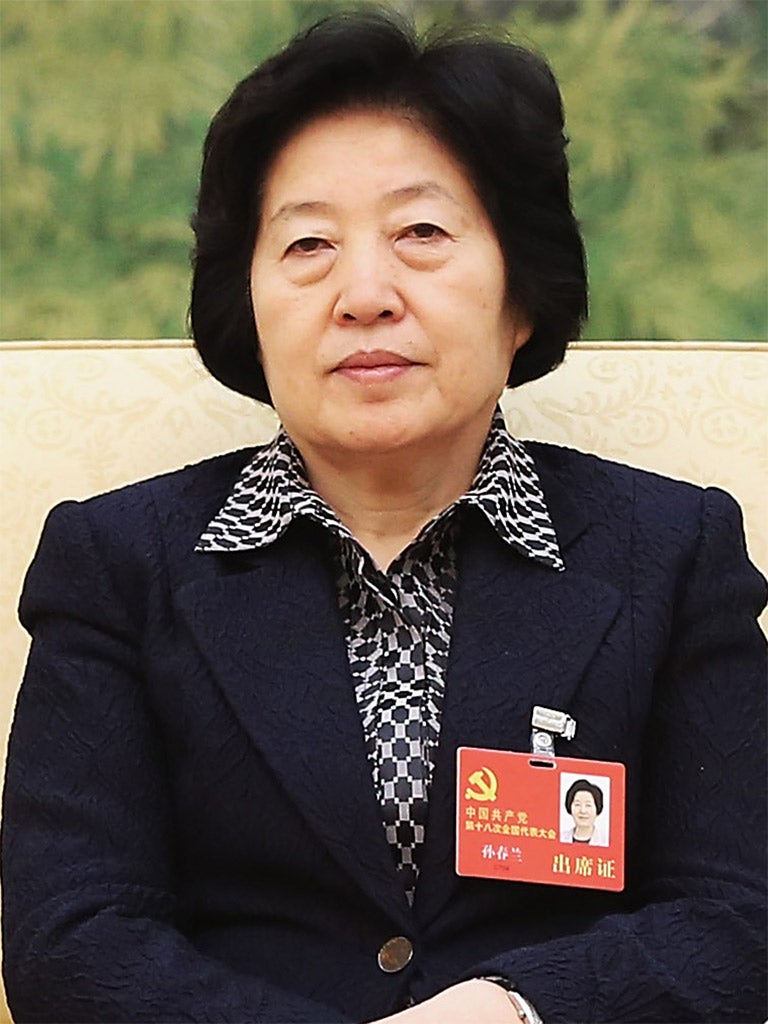China's most powerful woman - but how far can Sun Chunlan go?
Critics claim seat at Communist Party's all-male top table will remain closed to new chief of key province

After a leadership transition that left women off the top table of power, the Chinese government has promoted one of its most senior female officials to be the Communist Party chief of the northern city of Tianjin.
It’s a move which could lead to Sun Chunlan, 62, becoming the most powerful woman in China, as it might help her secure a place on the all-powerful Politburo Standing Committee in five years’ time.
Ms Sun, who was previously party chief in Fujian province in the south, is one of only two women on the Politburo, a 25-member panel that reports to the seven-man Standing Committee.
Just half an hour by high-speed train from Beijing, Tianjin is being transformed into a global financial hub and her predecessor as party chief, Zhang Gaoli, was elevated to the Standing Committee last week during the party congress.
“Sun Chunlan’s promotion was a reward for her loyalty to the centre and her political correctness… in five years she will definitely be the most senior woman politician,” Willy Wo-Lap Lam, an adjunct professor of history at the Chinese University of Hong Kong, said. “But I don’t think she has what it takes to go one step further into the Politburo Standing Committee. I don’t think the Chinese Communist Party is serious about promoting women. The old boys’ network is all-important. And most party leaders still harbour staunchly patriarchal views,” said Mr Lam.
Much of the focus since the election at last week’s 18th Party Congress of the Standing Committee, which is led by the Communist Party’s new general secretary, Xi Jinping, has been on whether it plans reform.
A Reuters report yesterday said that retired leaders in the party used a last-minute straw poll to block two pro-reform candidates from joining the Standing Committee.
Kerry Brown, a professor of Chinese politics at the University of Sydney, believes Ms Sun’s prospects are good.
“The Communist Party can’t go on being a wholly male-dominated empire when there are so many very, very successful female entrepreneurs, and women are now such a major part if the workforce. The party needs to feminise itself. Elevating a woman to the Standing Com- mittee would be a start,” he said.
Tianjin is very much a showcase city for China’s advances in the past three decades of reform and has seen a massive influx of investment. More than £100m was spent in the last three years on fixed asset investment alone on the Yujiapu housing development, which the government is trying to sell as its Manhattan. The city recorded 16.4 per cent growth in 2011.
“Her expertise is trade union-related “mass organisation” work, not high technology or finance, which makes one wonder whether she is the right person to run Tianjin,” Mr Lam said. “This is a sign of retrogression.”
Steve Tsang, of the China Policy Research Institute at the University of Nottingham, is not so sure that Ms Sun’s record in Fujian qualifies her to oversee the transformation of Tianjin. “The creation of another global financial centre that is comparable to Shanghai, let alone Hong Kong, will take quite a lot, and certainly more than the drive of its party secretary,” he said.
“Having said that, being put in charge of one of the special municipalities is a significant promotion, and being put in charge of Tianjian implies that she is now well placed to move higher still, if she proves herself,” he added.
Leaps forward: Powerful women
Liu Yandong
One of two female members of China’s Politburo, Ms Liu narrowly missed a promotion to become the first woman to join the all-powerful, seven-member Standing Committee at China’s recent power-transition.
Wu Yajun
Formerly China’s richest woman (she gave her ex-husband shares worth over HK$20 bn (£1.6bn) as part of their divorce settlement this week) the self-made multibillionaire remains a powerful figure in Chinese business.
Dong Mingzhu
Known to her many acolytes as “Sister Dong”, the formidable and charismatic businesswoman runs Gree, the world’s biggest maker of home air conditioners. She is quoted as saying: “I never miss. I never admit mistakes and I am always correct.”
Join our commenting forum
Join thought-provoking conversations, follow other Independent readers and see their replies
Comments
Bookmark popover
Removed from bookmarks